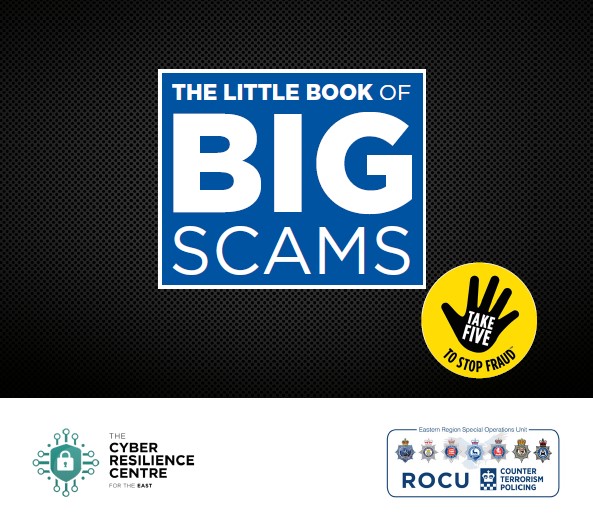We recently held a webinar Detective Nigel Sutton, Fraud and Cyber Security Advisor of the Serious & Organised Crime (Intelligence and Specialist Crime Department) with Cambridgeshire Constabulary. Below is a fantastic booklet packed full of fantastic advice and a brilliant article with tips and pointers from the Detetective.
PLEASE OPEN THIS STOP FRAUD BOOKLET FOR ADVICE ON HOW TO STAY SCAM AWARE: https://steelbones.sharepoint.com/:b:/s/SteelBones/EbyMTKX0X7lJlxaYaRbK4ycB59dCI40eCoZQlmUdlf_ivQ?e=4gIIbS
Protecting Steel Bones and families from fraud and cybercrime
Fraud and cyber crime also referred to as scams, make up nearly half of all crimes in England. Criminals send huge amounts of fake messages or make telephone calls intending to deceive us into believing they are genuine. They want us to believe they are genuine so we give away sensitive information including disclosing passwords and personal information, or they deceive us into making a payment using a bank card, or sending money to a criminally controlled bank account. Scams are always based on some form of impersonation, criminals pretending to be the police, the bank, telephone and internet companies, Amazon, Netflix, HMRC, NHS in fact, any recognisable organisation.
If you receive any communication, it is good practice to ask yourself the following:
Is this message or call ‘out of the blue’? Were you expecting it? Most scam messages are unexpected, the sender will state that you need to act now, they threaten that an account will be cancelled, or a service suspended. Don’t click on links or open attachments unless you are satisfied the sender is genuine, don’t reply or use contact telephone numbers within the message instead, use the genuine app, genuine website, and genuine telephone number. If the organisation is genuinely trying to contact you, there will be a notification within your account. Links in messages are just shortcuts to a webpage, criminals exploit the human instinct to take a shortcut.
Think ABCD.
A – Assume nothing
B – Believe nobody
C – Check everything
D – Discuss with trusted family, friend, staff, manager.
Don’t be pushed into making a decision there and then, criminals will use language that you need to act now, it is urgent.
Number spoofing is when criminals hide their true telephone number, so be careful when you see a number displayed on your phone, it may not be the actual number calling you. Criminals exploit number spoofing as they can find genuine numbers from the internet and hide behind it pretending to be someone they are not. If you don’t recognise the voice, how do you know they are genuine and are who they say they are? Remember A, B, C, D.
Be alert to emails and messages that appear to have come from family and friends asking for money. A common scam is to receive a message that appears to have come from someone you know, stating that they have lost their mobile phone and that they are using another, they then ask for money to be sent to account. If in doubt, ring the sender using a previously tried, tested, and trusted number, and ask whether or not they sent the message, you must save yourself a lot of stress and anxiety.
Be alert to fake text messages that state an attempt to deliver a parcel has been made and that in order to arrange another delivery the recipient is required to click on a blue link or call a number. Were you expecting a parcel? A genuine courier should post a small card through your letter box, if you don’t have such a card and have just received a text, then this could be a scam. If you click on the link, you will be taken to a fake webpage that will look like it represents a genuine courier, or mail delivery company which then invites you to submit personal information and/or to make a small payment with a bank card. By doing this, you will have revealed to the criminal all the information they need to exploit your bank account.
The police or bank will never call you ‘out of the blue’ asking you to move money, or to reveal your bank account information including card number, expiry date, password, PIN, account number, sort code and similar private information. End the call and for the police call 101 and 159 to speak with your bank, always ensure there is a dial tone on the line as sometimes criminals can keep the line open.
If you believe you have made a fraudulent payment and are a victim of fraud, then contact your bank or financial institution in the first instance, using a genuine app, website, or telephone number, don’t reply or use contact details from within the suspicious communication. The quicker you tell the bank, the increased chance of stopping the payment from reaching the criminal. In England, you can dial 159 to directly speak with your bank. Once the bank has been informed, please report to the police via Action Fraud www.actionfraud.police.uk or telephone 0300 123 2040.
Forward suspicious emails to the national Suspicious Email Reporting Service; report@phishing.gov.uk and forward suspicious text messages to 7726. By doing this, steps will be taken to remove criminal websites from the internet and criminal phones removed from the network which is disruptive to the criminal.
For more information on scams, how to recognise them, how to avoid them, use your search engine for ‘The Little Book of Big Scams’ It is also available on the Cambridgeshire Police website along with lots of other information. Visit www.cambs.police.uk and click on the section ‘Advice and Information’ followed by the section ‘Fraud’.
Top tips to help secure your computer.
Use a strong and separate password for your email account.
Create strong passwords using 3 random words.
Save your passwords in your browser.
Turn on two-factor authentication (2FA)
Update your devices with the latest apps, software, operating system.
Back up your important data to a cloud-based service and/or to a physical storage device, but keep the device disconnected after the backup has been made.
For more information on protecting you and your family from cyber crime visit; www.ncsc.gov.uk/cyberaware


Recent Comments